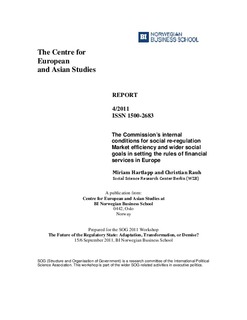| dc.contributor.author | Hartlapp, Miriam | |
| dc.contributor.author | Rauh, Christian | |
| dc.date.accessioned | 2012-11-08T13:49:31Z | |
| dc.date.available | 2012-11-08T13:49:31Z | |
| dc.date.issued | 2011 | |
| dc.identifier.issn | 1500-2683 | |
| dc.identifier.uri | http://hdl.handle.net/11250/95417 | |
| dc.description.abstract | With its scarce budgetary resources and institutional logics favouring market-based problemsolving,
the European Union (EU) has been considered a prime example of the regulatory
state. When and how can we expect the Commission to pursue aims beyond the mere increase
of efficiency in private market transactions? Can we expect Brussels to intervene where
societal interests demand re-regulation?
We draw up two ideal-type perspectives on market regulation and trace them empirically
along two regulatory processes concerning financial services: consumer credit regulation and
equal treatment in financial services, selected as recent instruments focussing explicitly on
presumably weaker parts in market transactions. Regulatory decisions are reconstructed along
semi-structured interviews with Commission officials from different DGs and hierarchical
levels conducted 2006-2009.
In both cases the Commission went beyond mere market-efficiency and changed the quality
of the financial market by favouring disadvantaged societal groups in its regulatory proposals.
Our process analyses suggest that there is a scope for a regulatory equality enhancing policy
which depends on pro-active agents within the Commission, the possibility to frame
regulatory beneficiaries as market participants, and the re-distribution of rights instead of
resources. | no_NO |
| dc.language.iso | eng | no_NO |
| dc.publisher | BI Norwegian Business School, Centre for European and Asian Studies | no_NO |
| dc.relation.ispartofseries | CEAS Reports;4/2011 | |
| dc.title | The Commission’s internal conditions for social re-regulation: Market efficiency and wider social goals in setting the rules of financial services in Europe | no_NO |
| dc.type | Working paper | no_NO |
| dc.source.pagenumber | 21 pages | no_NO |
